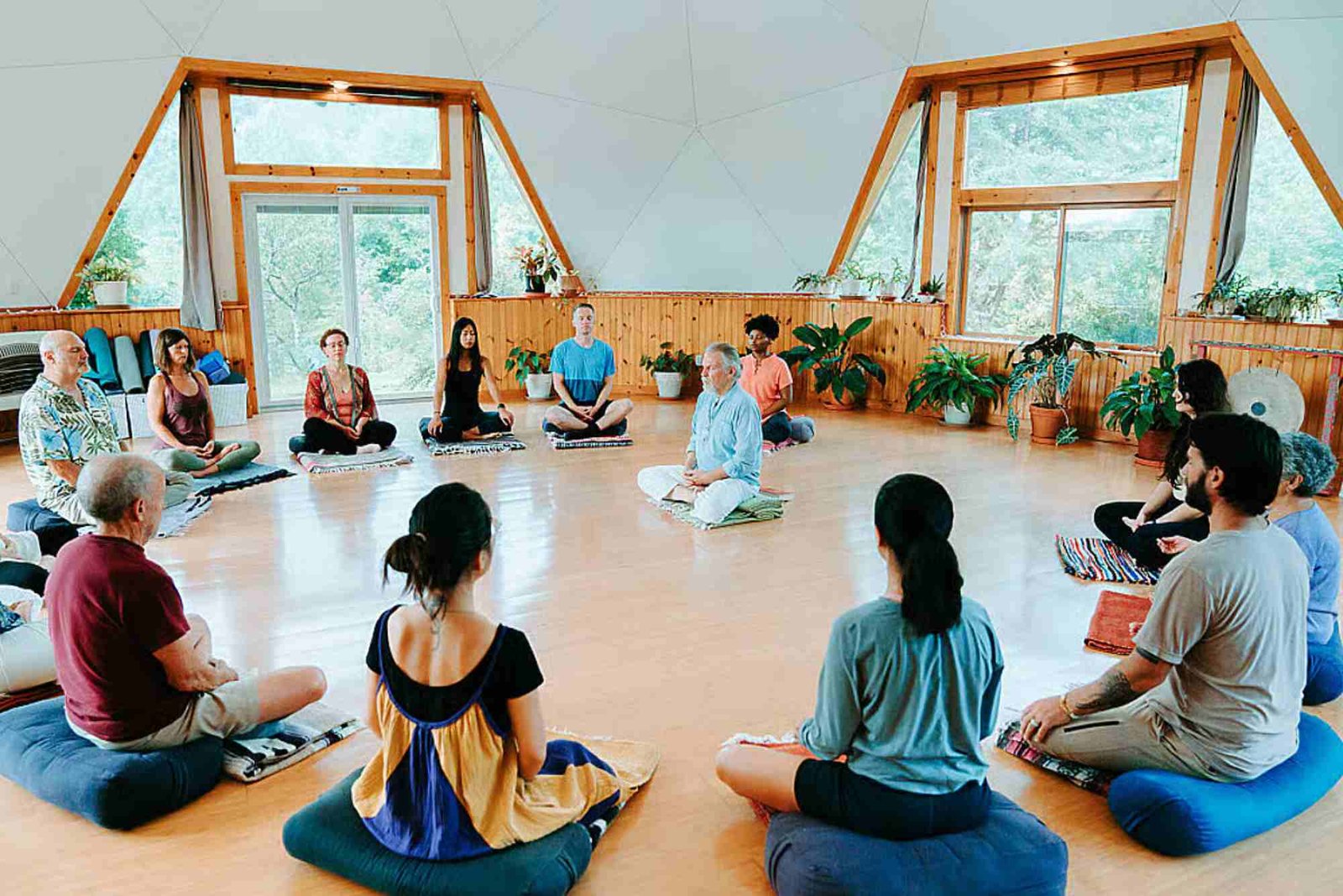Introduction
In today’s fast-paced world, where stress, anxiety, and burnout have become common, people are seeking ways to reconnect with themselves. One of the most effective ways to achieve this balance is through a Yoga and Meditation Retreat — Practical Tips and Expert Advice. Such retreats offer a peaceful environment to unplug from the noise of daily life and focus on inner well-being. Whether you are a beginner or an experienced practitioner, a retreat can transform your physical, mental, and spiritual health.
Understanding Yoga and Meditation Retreats
A Yoga And Meditation Retreat is a dedicated space where individuals immerse themselves in holistic practices. These retreats often take place in serene natural settings — near beaches, mountains, or forests — away from urban chaos. The goal is to rejuvenate both the body and mind through daily yoga sessions, guided meditations, mindful eating, and introspection. Participants also learn mindfulness techniques and how to integrate calmness into everyday life.
Unlike regular yoga classes, retreats offer an immersive experience. Days are structured with yoga practices, meditation sessions, workshops, and rest periods. You’ll find yourself not just exercising but also engaging deeply with your mind, learning how to slow down, breathe, and find clarity.
Why Attend a Yoga and Meditation Retreat?
People attend retreats for different reasons — stress relief, spiritual growth, or a digital detox. Whatever your motivation, the benefits are profound. Physically, yoga improves flexibility, balance, and strength. Mentally, meditation enhances focus, reduces anxiety, and fosters emotional stability. Spiritually, the retreat environment helps you reconnect with your inner peace.
During a Yoga And Meditation Retreat, participants also experience a sense of community. Sharing space with like-minded individuals fosters connection and support. You learn not just from instructors but also from fellow attendees who are on similar journeys of self-discovery.
How to Choose the Right Yoga and Meditation Retreat
Selecting the right retreat can make all the difference. With countless options available globally, consider these factors before making a decision.
Define Your Goals
Before booking, identify what you hope to gain. Are you looking for relaxation, deeper practice, or spiritual awakening? Some retreats emphasize physical yoga, while others focus on mindfulness and meditation. Knowing your goals helps you choose the right environment.
Check Instructor Credentials
Instructors play a key role in shaping your experience. Look for certified teachers with solid backgrounds in yoga, meditation, and wellness. Their guidance can enhance your practice safely and effectively.
Consider Location and Duration
Choose a retreat that aligns with your preferences — beachside, mountains, or countryside. Also, decide how long you can commit. Short weekend retreats are great for beginners, while 7- or 10-day programs allow for deeper transformation.
Understand the Schedule and Activities
Each retreat offers a unique schedule. Some combine yoga, meditation, and detox programs, while others include hiking, journaling, or workshops. Review the itinerary to ensure it suits your energy level and interests.
Budget and Accommodation
Costs vary widely. Consider what’s included — meals, accommodation, and activities. Luxury retreats may offer spa treatments, while budget-friendly ones focus more on community and simplicity.
If you’re planning your next retreat, explore this helpful guide on Yoga And Meditation for expert insights and preparation tips.
Preparing for Your Retreat Experience
Preparation is key to getting the most from your retreat. Here’s how you can make the experience more rewarding.
Pack Mindfully
Pack comfortable clothing suitable for yoga and meditation. Bring essentials like a reusable water bottle, journal, sunscreen, and any personal items you may need. Avoid overpacking — simplicity helps you stay focused.
Set an Intention
Before arriving, set a clear intention for your retreat. It could be “to find peace,” “to heal emotionally,” or “to build discipline.” This intention will guide your practice and help you stay centered throughout.
Limit Technology
Retreats are about disconnecting from digital distractions. Consider turning off your phone or limiting its use to emergencies. Being present allows you to fully absorb the healing energy of your surroundings.
Embrace Openness
Go with an open mind. You might encounter unfamiliar yoga styles or meditation techniques. Try them without judgment — each experience brings growth.
What to Expect During a Yoga and Meditation Retreat
Every retreat follows its rhythm, but here’s what a typical day might look like.
Morning starts with sunrise meditation or pranayama (breathing exercises) followed by an energizing yoga session. After breakfast, there may be workshops on mindfulness, philosophy, or nutrition. Afternoons often include gentle yoga, rest, or nature walks. Evenings end with calming meditations or group reflections.
Meals are usually vegetarian or vegan, emphasizing clean and nourishing food. Silence is often observed during meals to promote mindful eating. Free time between sessions encourages journaling, contemplation, or connecting with others.
Expert Advice for Making the Most of Your Retreat
To ensure a transformative experience, consider these expert recommendations.
Stay Consistent
Participate fully in all sessions. Skipping activities can break the flow of your practice. The more consistent you are, the deeper your results will be.
Be Kind to Yourself
It’s natural to face challenges — physical fatigue, emotional release, or restlessness. Treat yourself with compassion and patience. Remember, transformation takes time.
Reflect and Journal
Document your experiences, thoughts, and emotions daily. Journaling helps track your progress and brings clarity to your inner journey.
Stay Hydrated and Rested
Drink plenty of water and honor your body’s need for rest. A well-hydrated, well-rested body enhances mental focus and physical performance.
Continue the Practice at Home
After returning, maintain your routine. Even 10–15 minutes of daily yoga or meditation keeps the benefits alive. Integrate lessons learned into your everyday life.
If you’d like to deepen your understanding of yoga techniques, Read more on www.verywellfit.com — a trusted resource for yoga and wellness education.
The Transformative Benefits of Yoga and Meditation Retreats
A Yoga And Meditation Retreat offers holistic healing that extends beyond the retreat itself. The benefits include:
-
Physical wellness: Improved flexibility, strength, posture, and overall vitality.
-
Mental clarity: Reduced anxiety, improved focus, and emotional balance.
-
Spiritual awakening: Enhanced self-awareness and a deeper sense of connection with the universe.
-
Better lifestyle habits: Conscious eating, regular practice, and mindfulness become natural.
-
Emotional release: Letting go of past stress and embracing inner peace.
These benefits often last long after you return home, influencing your work, relationships, and outlook on life.
Common Mistakes to Avoid
While retreats are enriching, certain mistakes can limit the experience. Avoid comparing your progress with others. Everyone’s journey is unique. Don’t expect instant transformation — growth unfolds gradually. Also, resist the urge to overexert yourself physically. Yoga and meditation are about balance, not competition.
How to Integrate Retreat Lessons into Daily Life
The real magic of a retreat lies in bringing its lessons back into your daily routine. Start your mornings with short meditation or breathing exercises. Practice gratitude before sleeping. Keep your meals simple and mindful. Engage in regular yoga, even if only a few poses a day.
You can also create your mini-retreats at home. Set aside one day a month to disconnect, meditate, and reflect. This helps sustain the peace and awareness you cultivated during your retreat.
Frequently Asked Questions
What should I bring to a yoga and meditation retreat?
Bring comfortable clothing, a yoga mat, reusable water bottle, sunscreen, and a journal. Avoid unnecessary gadgets to stay mindful.
Are retreats suitable for beginners?
Yes, most retreats welcome all levels. Instructors provide modifications to suit beginners, ensuring everyone feels comfortable.
How long should a yoga and meditation retreat last?
A retreat can last from two days to several weeks. Beginners often start with weekend retreats, while deeper programs span seven to ten days.
What type of yoga is practiced at retreats?
Retreats may include Hatha, Vinyasa, Yin, or Restorative yoga. Some also blend yoga with mindfulness, breathwork, and chanting.
How do I maintain retreat benefits afterward?
Continue practicing yoga and meditation daily, stay mindful in your activities, and prioritize self-care.
A Yoga and Meditation Retreat — Practical Tips and Expert Advice is more than a getaway — it’s a pathway to holistic transformation. By dedicating time to stillness, movement, and self-reflection, you restore balance in every area of life. Whether your goal is relaxation or spiritual awakening, the benefits of such a retreat are lasting and profound.
Ready to embark on your journey of self-discovery? Begin planning your own Yoga And Meditation Retreat today and experience the peace that comes from within.















